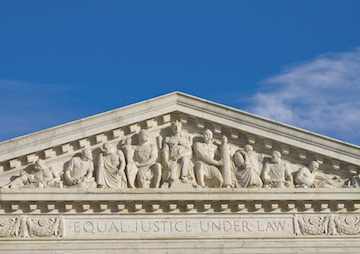Caving to Coal Interests, Supreme Court Blocks Key Climate Action
"We’re disappointed the rule has been stayed, but you can’t stay climate change and you can’t stay climate action," says an Environmental Protection Agency spokeswoman. Shutterstock
Shutterstock
By Nadia Prupis / Common Dreams
In a startling ruling Tuesday night, the U.S. Supreme Court blocked President Barack Obama’s sweeping plan to lower greenhouse gas emissions, pending resolution of a last-gasp lawsuit filed against the initiative by the coal industry.
Voting 5-4, the justices ordered the Obama administration not to implement the Clean Power Plan (CPP) until it has been reviewed by the U.S. Court of Appeals for the District of Columbia Circuit, with arguments set for June 2.
According to SCOTUSBlog, that means the plan may end up being stalled “until after the president leaves office next January,” and spares coal-power plant operators from “having to do anything to begin planning for a shift to energy sources that the government considers to be cleaner.”
Environmental groups said the ruling was a step in the wrong direction, but remained confident that the D.C. district court would uphold the CPP on legal merits and that clean energy, with widespread public support, would triumph over the fossil fuel industry.
“If there was ever a Supreme Court decision that looked backwards instead of towards the future, this was it,” said Jamie Henn, communications director of the climate group 350.org. “Make no mistake, this case was brought forward on behalf of the fossil fuel industry and companies like ExxonMobil who will hold back change by any means necessary, but their days are numbered. The American people overwhelmingly support efforts to fight climate change and momentum is on our side.”
A slew of utility companies and 29 largely Republican-led states filed a legal challenge (pdf) in October against the CPP and the Environmental Protection Agency (EPA), which crafted the plan, stating that the department had intruded on states’ sovereign rights over industry within their borders by ordering them to meet certain climate targets. The CPP requires states to cut greenhouse gas emissions from coal-powered plants by a third by 2030 from 2005 levels.
Tuesday’s order had the support of Chief Justice John G. Roberts, Jr., and Justices Samuel A. Alito, Jr., Anthony M. Kennedy, Antonin Scalia, and Clarence Thomas. “The D.C. Circuit will review the plan before a three-judge panel but, once the panel has ruled, the case could be reheard by the full court of appeals before moving on to the Supreme Court,” SCOTUSblog’s Lyle Denniston wrote.
Erich Pica, executive director of Friends of the Earth, warned that the court’s decision delays implementation of the CPP “while we are running out of time to combat climate change.”
“It did not, however, address the merits of the case. The Environmental Protection Agency spent years crafting the Clean Power Plan, which has a strong legal foundation in the Clean Air Act. The rule has overwhelming support among the American people,” Pica said, adding that the court’s decision was a call “to all who care about our planet to demand more from our politicians as we fight climate change.”
The White House issued an immediate disagreement with the ruling.
EPA spokesperson Melissa Harrison said, “We’re disappointed the rule has been stayed, but you can’t stay climate change and you can’t stay climate action. We believe strongly in this rule and we will continue working with our partners to address carbon pollution.”
Your support matters…Independent journalism is under threat and overshadowed by heavily funded mainstream media.
You can help level the playing field. Become a member.
Your tax-deductible contribution keeps us digging beneath the headlines to give you thought-provoking, investigative reporting and analysis that unearths what's really happening- without compromise.
Give today to support our courageous, independent journalists.






You need to be a supporter to comment.
There are currently no responses to this article.
Be the first to respond.